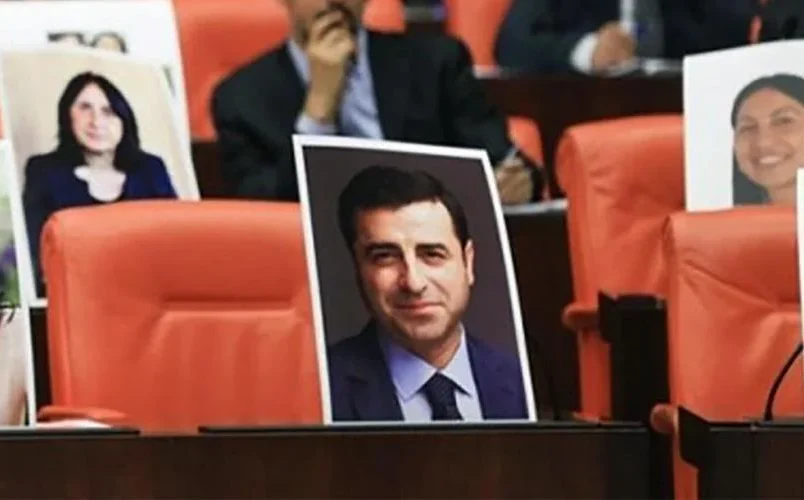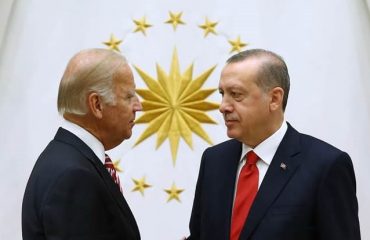

HDP’s former co-leader Selahattin Demirtaş arrested in 2016. His social media posts from Edirne Prison over deadly Mersin Attack of PKK sent a message to both PKK and AKP Government as well as to his own party HDP, forcing it and the parliament to make a choice. (Photo: HDP)
Following the suicide bombing attack on a police station in the Southern province of Mersin on Sep. 26, imprisoned politician Selahattin Demirtaş, the former co-chair of the Kurdish-issue-focused People’s Democracy Party (HDP), posted a series of messages on his Twitter account on the evening of 30 September.
With these messages, Demirtaş was taking a stance not only against the government as expected, but he was also taking a stance against the outlawed Kurdistan Workers Party (PKK) unexpectedly.
Demirtaş was almost defying the PKK, and with this move, he was forcing both the HDP and the parliament which has started the new legislative year, to make a choice.
What did Demirtaş say?
The sentences that give the essence of the messages Demirtaş sent from Edirne Prison are as follows:
“Insisting on democratic politics and peace politics are basic principles for us. No one should expect us to take a step back. We will defend our principles in all circumstances, and we will continue to voice the people’s demand for a democratic solution and peace with all our means. We will destroy fascism, we will definitely win.”
“Of course, this comes at a cost. I risk being labeled as the neighborhood’s crazy, populist, one man, coward’ or the ‘terrorist, murderer’ of the opposite neighborhood.”
“Even if I am left alone, I will never stop defending the truths I believe in, as opposed to those who do ‘politics’ from within their comfort zone in silence. One day history will judge us all by what we say and don’t say.”
Who did he target?
Demirtaş’s obvious and usual target was the ruling Justice and Development Party (AKP) government. His response to Interior Minister Süleyman Soylu, who posted social media posts calling the former HDP co-chair a murderer and blaming him for the bloody events on October 6-8 2014, was an indicator of this target.
“Don’t confuse me with all those jackals around you,” Demirtaş posted on his Twitter account on Sep. 26 as a response to Soylu’s accusations.
The exchange of tweets with accusations and strong words between the two was a result of Demirtaş’s swift message condemning the PKK attack on the police station in Mersin.
This is what he means by saying “I risk being labeled as the terrorist and murderer of the opposite neighborhood”.
But messages also had a covert addressee. For example, taking the risk of being labeled as the “coward of the neighborhood” directly targets the outlawed PKK, even though he does not name it directly. As Murat Sabuncu from T24 news outlet indicated, the note the PKK claimed responsibility for the Mersin attack, included the phrase: “the condemnation of the attack by the language of the enemy for whatever reason can only be explained by intimidation.” What they called the enemy was Turkey, and they clearly pointed to Demirtaş and HDP which openly condemned the attack.
Demirtaş was addressing the PKK when he said “taking the risk of being labeled”; and he was targeting some HDP members when he said, “those who make politics from within their comfort zones in silence”.
Mersin message: A crossroad?
It is as if Demirtaş is actually defying the PKK’s Mersin attack. With his voice, he almost reveals that the PKK is trying to sabotage the democratic parliamentary political tendencies of the HDP with the terrorist act in Mersin. From this point of view, the PKK’s attack on Mersin can also be seen as a brutal and bloody intervention to say that “We set the agenda, not you”; as the left-wing had just announced their Labor and Freedom Alliance declaration around the HDP on September 24, two days before that.
Behind the bloody events of October 6-8, 2014, which Soylu reminded, there was a debate over whether Turkey should help the PYD, the Syrian branch of the PKK, which controls the Syrian town of Kobani (Ayn al Arab) against ISIS attacks. Demirtaş is still on trial in the Kobani Case. The Kobani shift not only hit a blow to the dialogue process with Abdullah Öcalan, the imprisoned leader of the PKK, initiated by President Tayyip Erdogan, the prime minister of the time, through the National Intelligence Organization (MIT) and HDP. At the same time, it was the turning point of the increasingly deepening divisions in Turkey-US relations. When US President Barack Obama failed to get the support he hoped for from Erdogan against ISIS, he made an impulsive decision to partner with the Syrian branch of the PKK.
2015 Ceylanpinar, 2022 Mersin
The event that officially ended the AKP’s indirect dialogue process with the PKK was the murder of two police officers in their homes in the Ceylanpınar district of Şanlıurfa on July 22, after the AKP lost its parliamentary majority in the June 7, 2015 elections. Then, Turkey experienced bloody times; the AKP regained the majority in the November 1, 2015 elections with the support of nationalist MHP leader Devlet Bahçeli; then the 2016 coup attempt took place and the transition to the presidential system.
Many commentators linked the Ceylanpınar attack with the PKK’s Mersin attack on the way to the 2023 elections.
Demirtaş is actually making a serious self-criticism with his messages.
He is warning the HDP not to fall into a similar trap to 2014-2015 by being caught in between the PKK which relies on the support of the USA on one hand and the government on the other. The way to do this is to insist on democratic parliamentary politics.
In my opinion, there is also a message to the Parliament here. That is, preventing the HDP from being thrown out of the system and supporting it to remain in the democratic parliamentary system. The solution is not closing, banning the party.
Both the political parties in the Grand National Assembly of Turkey, especially the six opposition parties in the alliance, and the HDP bear a great responsibility.


